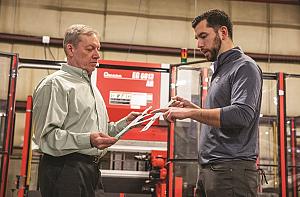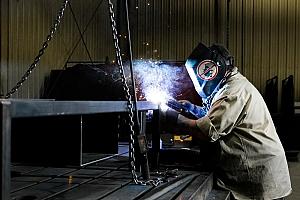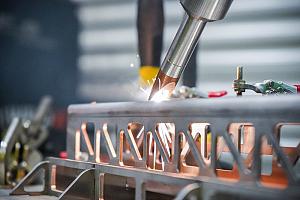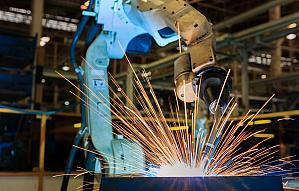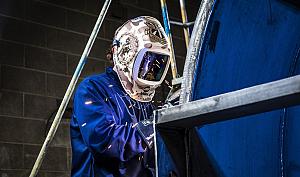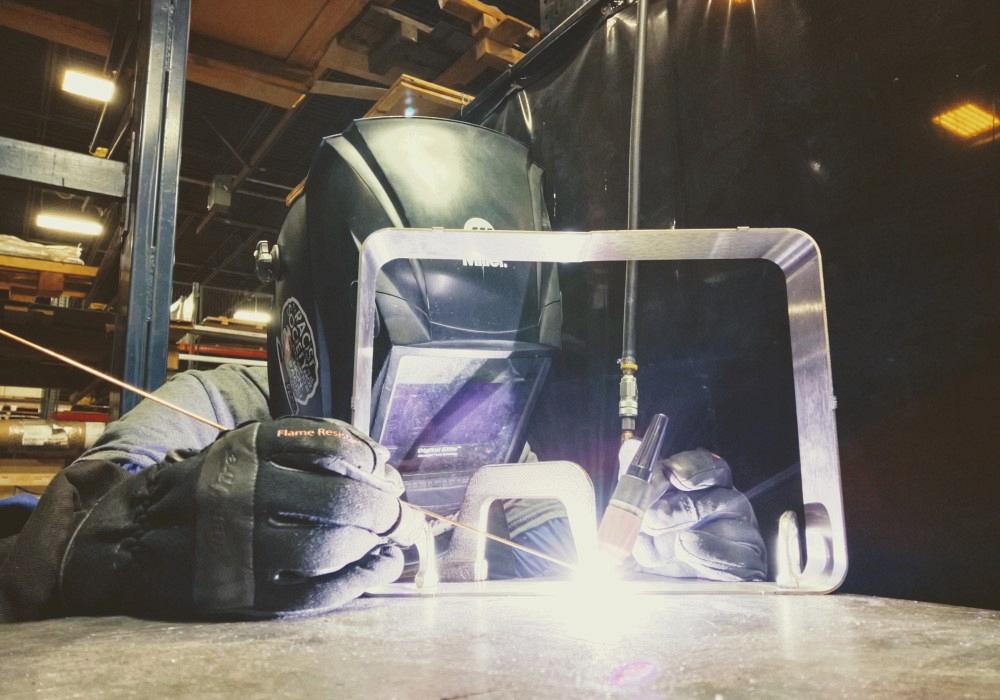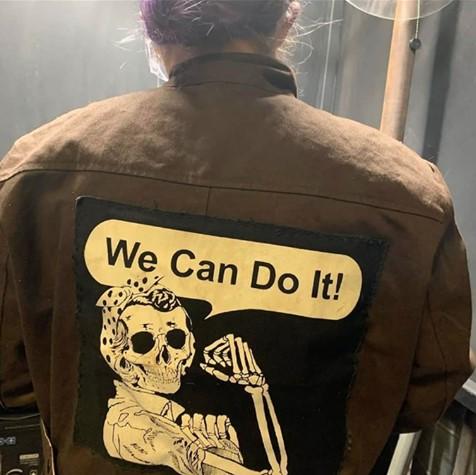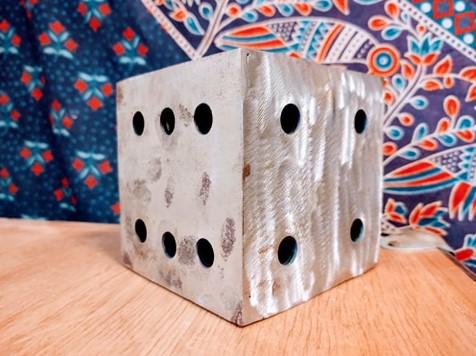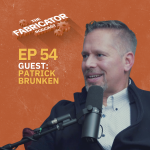- FMA
- The Fabricator
- FABTECH
- Canadian Metalworking
Categories
- Additive Manufacturing
- Aluminum Welding
- Arc Welding
- Assembly and Joining
- Automation and Robotics
- Bending and Forming
- Consumables
- Cutting and Weld Prep
- Electric Vehicles
- En Español
- Finishing
- Hydroforming
- Laser Cutting
- Laser Welding
- Machining
- Manufacturing Software
- Materials Handling
- Metals/Materials
- Oxyfuel Cutting
- Plasma Cutting
- Power Tools
- Punching and Other Holemaking
- Roll Forming
- Safety
- Sawing
- Shearing
- Shop Management
- Testing and Measuring
- Tube and Pipe Fabrication
- Tube and Pipe Production
- Waterjet Cutting
Industry Directory
Webcasts
Podcasts
FAB 40
Advertise
Subscribe
Account Login
Search
Still Building America: Health care worker turned metal fabricator
Morgan Spurr of Rochester, N.Y., falls in love with welding after working in mental health care
- By Darla Welton and Josh Welton
- August 15, 2020
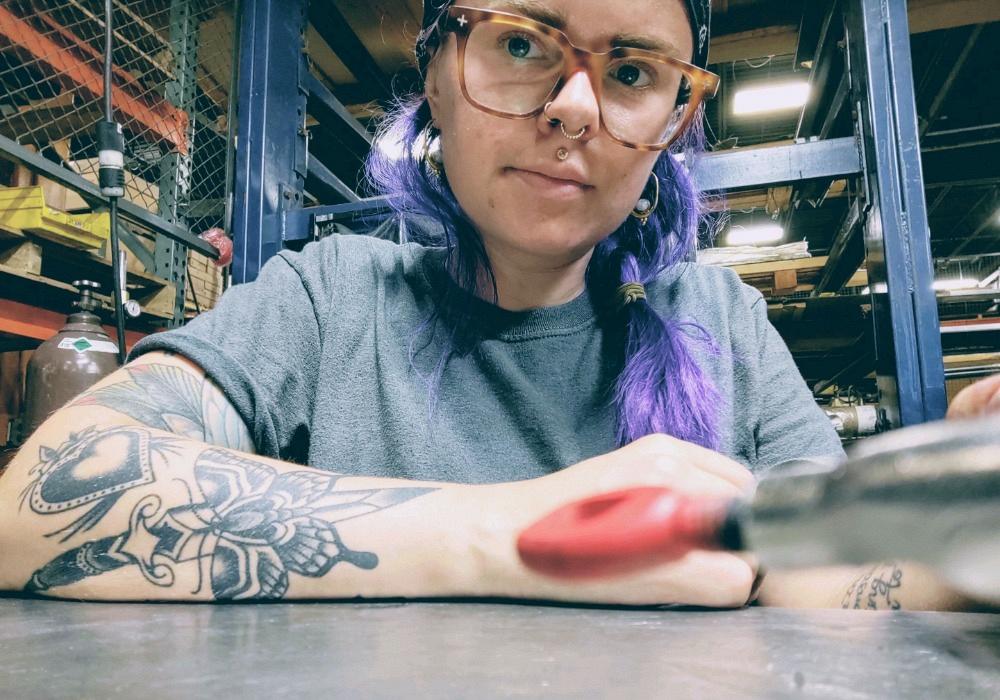
After six years working as a mental heath care professional, Morgan Spurr of Rochester, N.Y., discovers a love for welding with inspiration from Women Who Weld. Image provided by Morgan Spurr
We typically seek out individuals to interview for the Still Building America series. However, this time around, a trade school student reached out to Josh via social media. “My name is Morgan and I'm currently a welding student in Rochester, N.Y. Because of the virus, we've been doing a lot of online work, and were assigned to research a company, and I am actually doing Brown Dog Welding.”
So we flipped the script and thought it’d be fun to ask Morgan about herself too. We loved hearing her thoughts about learning new skills as an adult, and how her love for art and working with her hands inspired her welding career choice.
Darla Welton: Tell us about yourself, Morgan.
Morgan Spurr: I am a resident of Rochester, N.Y., who likes to weld, paint, longboard, cook, and spend time with my fiance, friends, and family. I currently work for a metal fabrication company based in Rochester as a welder/multifunctional operator. When there is work that matches my current skill level of welding in the shop, I mainly GTAW/TIG weld steel parts. I also float around on the spot welder and within the assembly department. I also have one month left of school at Roc Arc + Flame Center in Gates N.Y.
DW: How did you decide to get into welding?
MS: My path into welding can be perplexing to some. I had been working in the mental health care system for about six years and found it increasingly difficult to work within a broken health care system. Acknowledging the importance of mental health care and awareness will always be important to me, but I felt a strong urge to find a career that would allow me to use my hands daily. I literally googled “welding programs” in Rochester, found the school I currently attend, sent a spastic email about my interest, and attended an informational session shortly after. After leaving that informational session, I signed up for an interview about a week later for the admission process. I was not heavily convinced I would get in; my math test score wasn’t great, and I had no prior welding experience. I was initially waitlisted until a spot opened up, and with little doubt in my mind I immediately accepted it. School definitely hasn’t been easy for me; ironically, I find GMAW/MIG the hardest, and often fabrication sends me into a panic. When we started TIG in class, though, I immediately fell in love with the process and it made sense to me in a way other welding processes hadn’t yet. Around the same time I was pulled into the welding department at my job where I mainly do TIG welding.
DW: What type of training do you have?
MS: My training right now starts and ends with school. Roc Arc + Flame Center also offers recreational welding classes, and I took a MIG class before starting school. I have also been trained in resistance welding at work, as well as getting tips from my co-workers on TIG welding.
DW: Who has inspired your welding journey?
MS: I am inspired by individuals who believe that anyone can learn to weld if they truly have a desire to learn. I am particularly inspired by Samantha Farrugia who founded Women Who Weld in Detroit. Women Who Weld is a training program specifically for women to train them for employment in the welding industry. I reached out to them when I was looking for role models and support with school and they got back to me within days. I love the fact that more and more women are drawn to welding, and I am one of four women in my class at school. My fiance David has also been a huge support for me, initially with trying welding in the first place, and he has helped to keep me positive and optimistic throughout school.
DW: Are there other life experiences or hobbies that have fueled your welding passion?
MS: I have always loved making art and still do. I’m inspired by traditional American tattoo styles from the 1950s, with bold lines and bright colors. I realized early on that it was something better suited as a hobby for me, but I still felt that pull toward a career that would let me work with my hands. I also really appreciated that welding is a skill, and like any skill, it takes time, patience, and practice. You get out what you put into it.
DW: Has welding brought any interesting life opportunities to you so far?
MS: Welding has brought me appreciation for learning a new skill as an adult. As a kid it can be much easier to pick up a new hobby, skill, instrument, etc., and quickly learn or adapt to it. I think as adults when we try a new skill, sometimes we expect ourselves to instantly be good at it or get it right away. I have been guilty of this myself, sometimes giving up a new hobby prematurely. With welding, though, having the component of being in school almost forced me out of that mindset. I still am hard on myself when I do not get something, but I am as equally fired up to try it again. Welding gave me a new way to be engaged, and if I stay committed to the learning process, a skill that can last a lifetime.
DW: What is your favorite thing about welding?
MS: My favorite thing about welding is how internally motivated it can make you. You may be the only one who notices the bead profile change on your own welds, or it might click when you’re on your own that the line in your gas isn’t flowing right and that’s the problem you are facing, but when you start not only understanding but speaking the language of welding to yourself, your progress becomes more visible and incredible to see. My progress and understanding right now aren’t anywhere close to someone who has been welding for 10-30 years, but sometimes I just think about how a year ago anything and everything welding was pretty foreign to me and I’m amazed by that alone. I’ve also kept all of my first T joints that I did at the beginning of school, which was a year ago, to remind myself of visual proof that I’ve progressed even when it doesn’t feel like it.
DW: Do you have a favorite welding project or welding achievement of which you are particularly proud?
MS: I have a small jewelry box I fabricated and welded for my fiance that I am proud of and a metal die I made for school.
DW: What has been the most challenging part of your welding career so far? Have you run into any roadblocks as a woman in the industry?
MS: I think the most challenging thing about the industry for me has been communication, or rather the lack thereof. It is also frustrating when productivity rate or level is valued over quality of work for a newcomer. I think there is still an assumption that as a woman I cannot handle certain aspects of the job, like working on heavier parts or grinding for a whole shift, and it's something I have experienced. Being 5 ft. tall doesn’t help with that assumption, either, or my size can work against me at times. For example, my hands are sometimes a little too small to grip certain grinders we use at work, but I still try my best to get that baby going.
DW: Did COVID-19 affect your job at all?
MS: I was laid off a little over a week because of COVID-19. When I was brought back to my company, there was downsizing that happened and changes once we got back. We are required to get our temperature taken each morning, and if we have a fever, we are sent home for three days and can’t come back until our fever has gone away. Being a welder does have its advantages with social distancing, though; no one is really coming into my booth or working near me.
DW: How did your trade school handle the COVID-19 shutdowns?
MS: My trade school was definitely affected more by COVID-19 than my job. Being accredited by Monroe Community College, we had to follow their stance on the pandemic, which meant my school shutting down and diving into online learning. For my class specifically, this was especially hard because we were in the middle of a midterm and were pretty much past the mark of theory. This left mostly lab time for the rest of the program, which we could no longer do until the school could reopen. The owner of the school, the director of the program and the welding instructors immediately set up an online learning program. We had Google meetup video sessions to keep us checked in and had individuals working in the welding industry speak to us. The unfortunate truth of the matter is that it eliminated the ability to practice welding for a lot of my classmates for about three months. I consider myself lucky that I still had the chance to weld at work. I didn’t have the chance to do any fabricating though, and when we came back it was quite evident that I lost some of what I had learned and my confidence has also been affected by that. Although the staff tried their best to adapt to the situation, we missed out on a lot of lab time.
DW: What are your future goals/dreams for your career?
MS: Right now I think I am still figuring out my path for welding. I know that I love TIG welding the most, and I hope to combine art and welding in some way in the future. For now I still have a lot to learn and know I need to get the basics down before I can venture in that direction. I also hope at some point in my life to become involved with helping other women learn how to weld. I have encountered the mentality that welding is all about confidence, and while I don’t disagree that it holds its place, I think it is totally OKokay to admit when you are struggling or seek guidance when you are still learning. Everyone learns differently, and I think that women teaching other women skills is important too.
DW: What advice would you give to someone currently considering a career in welding?
MS: My advice would be to speak to others who weld if you know anyone, and to find content that can help you understand the industry as well as hear others’ experiences. The “Arc Junkies” podcast has been great for me to learn about things that I will not hear about in a classroom, as well as hear from other individuals about their own welding journeys.
subscribe now

The Fabricator is North America's leading magazine for the metal forming and fabricating industry. The magazine delivers the news, technical articles, and case histories that enable fabricators to do their jobs more efficiently. The Fabricator has served the industry since 1970.
start your free subscriptionAbout the Authors
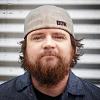
Josh Welton
Owner, Brown Dog Welding
(586) 258-8255
- Stay connected from anywhere

Easily access valuable industry resources now with full access to the digital edition of The Fabricator.

Easily access valuable industry resources now with full access to the digital edition of The Welder.

Easily access valuable industry resources now with full access to the digital edition of The Tube and Pipe Journal.
- Podcasting
- Podcast:
- The Fabricator Podcast
- Published:
- 05/07/2024
- Running Time:
- 67:38
Patrick Brunken, VP of Addison Machine Engineering, joins The Fabricator Podcast to talk about the tube and pipe...
- Trending Articles
Young fabricators ready to step forward at family shop
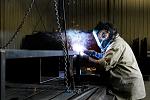
Material handling automation moves forward at MODEX

A deep dive into a bleeding-edge automation strategy in metal fabrication
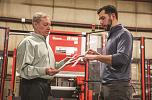
White House considers China tariff increases on materials

BZI opens Iron Depot store in Utah
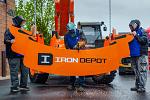
- Industry Events
Laser Welding Certificate Course
- May 7 - August 6, 2024
- Farmington Hills, IL
World-Class Roll Forming Workshop
- June 5 - 6, 2024
- Louisville, KY
Advanced Laser Application Workshop
- June 25 - 27, 2024
- Novi, MI
Precision Press Brake Certificate Course
- July 31 - August 1, 2024
- Elgin,


